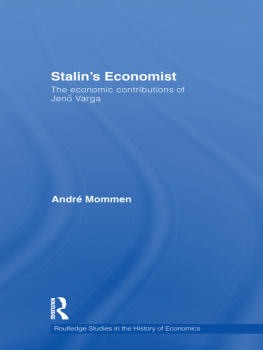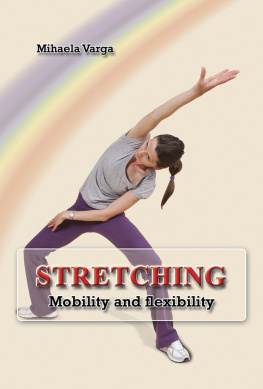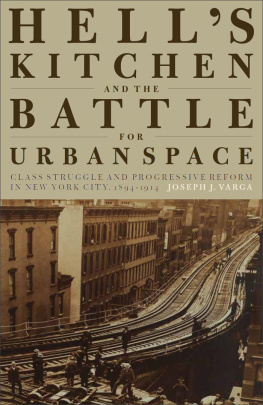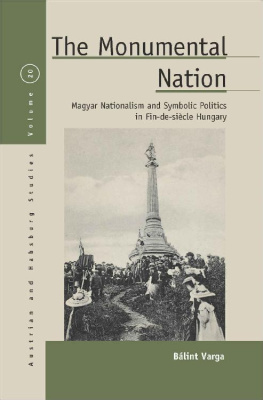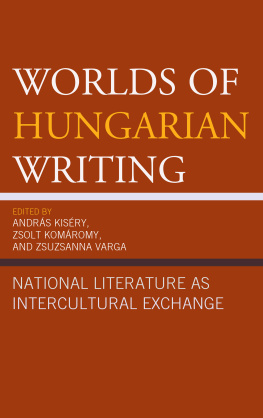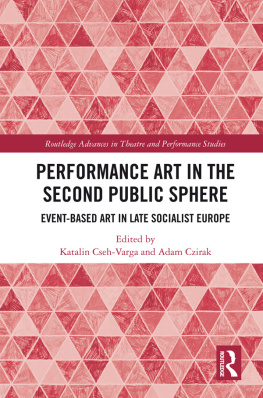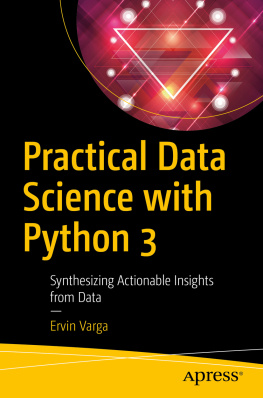Stalins Economist
This book analyses the contribution of Eugen (Jen) Varga (18791964) on Marxist-Leninist economic theory as well as the influence he exercised on Stalins foreign policy and through the Comintern on the international communist movement. During the Hungarian Councils Republic of 1919 Varga was one of those chiefly responsible for transforming the economy into one big industrial and agrarian firm under state authority. After the fall of the revolutionary regime that year, Varga joined the Hungarian Communist Party, soon after which he would become one of the Cominterns leading economists, predicting the inevitable crisis of the capitalist system.
Varga became the Soviet Unions official propagandist. As an economic specialist he would advise the Soviet government on German reparation payments and, unlike Stalin, believed that the capitalist state would be able to plan postwar economic recovery, which contradicted Stalins foreign policy strategy and led to his disgrace. Thus by the beginning of the Cold War in 1947, Varga was discredited, but allowed to keep a minor academic position. After Stalins death in 1953 he reappeared as a well respected economist whose political influence had nonetheless waned.
In this study Mommen reveals how Stalins view on international capitalism and inter-imperialist rivalries was profoundly influenced by debates in the Comintern and by Vargas concept of the general crisis of capitalism. Though Stalin appreciated Vargas cleverness, he never trusted him when making his strategic foreign policy decisions. This was clearly demonstrated in August 1939 with Stalins pact with Hitler, and in 1947, with his refusal to participate in Marshalls European Recovery Plan.
This book should be of interest to a wide variety of students and researchers, including those concentrating on the history of economic thought, Soviet studies, international relations, and European and Cold War history.
Andr Mommen obtained a Ph.D. in Political Science from the Free University Brussels, Belgium, where he went on to lecture, before moving to the Department of Political Science at the University of Amsterdam, Netherlands.
Tables
Acronyms
| AMOSZ | Alkalmazott Mrnkk Orszaggos Szvetsge, National Association of Engineers |
| AON | Akademiya Obshshestvennych Nauk, Academy of the Social Sciences of the Soviet Communist Party Central Committee, Moscow |
| CPSU | Communist Party of the Soviet Union |
| DACOB | Archief en Bibliotheek voor de Studie van het Communisme, Archives and Library for the Study of Communism, Brussels |
| ECCI | Executive Committee of the Communist International |
| ERP | European Recovery Program |
| FKOSZ | Fldmunksok s Kisbirtokosok Orszgos Szvetsge, National Conference of Agricultural Workers and Smallholders |
| GDP | Gross Domestic Product |
| GDR | German Democratic Republic |
| Gosplan | State Planning Committee |
| HSZ | Huszadik szzad, Twentieth Century |
| IMEMO | Institut Mirovoy Ekonomiki i Mezhdunarodnikh Otnoshenniy, Institute of World Economy and International Relations |
| IPC | International Press Correspondence |
| IPK | Internationale Presse-Korrespondenz |
| KGB | Committee for State Security |
| KI | Kommunistische Internationale |
| KKP | Komunistyczna Partia Polski, Communist Party of Poland |
| KPD | Communist Party of Germany, Kommunistische Partei Deutschlands |
| KPJ | Communist Party of Yugoslavia |
| KP | Communist Party of Austria, Kommunistische Partei sterreichs |
| KSZ | Kzgazdasgi szemle |
| MDP | Magyar Dolgzok Prtja, Hungarian Workers Party |
| MKP | Kommunistk Magyarorszgi Prtja, Hungarian Communist Party |
| MOL | Magyar Orszgos Levltr, Hungarian State Archives, Budapest |
| MSZDP | Magyarorszgi Szocildemokrata Prt, Hungarian Social-Democratic Party |
| MSZMP | Magyar Szocialista Munksprt, Hungarian Socialist Workers Party |
| MSZP | Magyar Szocialista Prt, Hungarian Socialist Party |
| NEP | New Economic Policy |
| NKVD | Peoples Commissariat for Internal Affairs |
| NRA | National Recovery Act |
| NZ | Die Neue Zeit |
| PCF | Parti Communiste Franais, French Communist Party |
| PCI | Partito Communista Italiano, Italian Communist Party |
| PIL | Politkatrtneti Intzet, Institute of Political History, Budapest |
| POB | Parti Ouvrier Belge, Belgian Labour Party |
| POW | Prisoners of War |
| PSI | Partito Socialista Italiano, Italian Socialist Parti |
| RGASPI | Russian State Archives of Social -Political History, Moskou |
| SFIO | Section Franaise de lInternationale Ouvrire, French Section of the Socialist Workers International |
| SPD | Sozialdemokratische Partei Deutschlands, Social-Democratic Party of Germany |
| TsKhSD | Central Repository of Documents of Recent Documentation, Moskou |
| USPD | Unabhngige Sozialdemokratische Partei Deutschlands, Independent Social-Democratic Party of Germany |
| USSR | Union of Socialist Soviet Republics |
| VKP(b) | All-Union Communist Party |
Routledge studies in the history of economics
1 Economics as Literature
Willie Henderson
2 Socialism and Marginalism in Economics 18701930
Edited by Ian Steedman
3 Hayeks Political Economy
The socio-economics of order
Steve Fleetwood
4 On the Origins of Classical Economics
Distribution and value from
William Petty to Adam Smith
Tony Aspromourgos
5 The Economics of Joan Robinson
Edited by
Maria Cristina Marcuzzo,
Luigi Pasinetti and
Alesandro Roncaglia
6 The Evolutionist Economics of Lon Walras
Albert Jolink
7 Keynes and the Classics
A study in language,
epistemology and mistaken
identities
Michel Verdon
8 The History of Game Theory, Vol. 1
From the beginnings to 1945
Robert W. Dimand and
Mary Ann Dimand
9 The Economics of W. S. Jevons
Sandra Peart
10 Gandhis Economic Thought
Ajit K. Dasgupta
11 Equilibrium and Economic Theory
Edited by Giovanni Caravale
12 Austrian Economics in Debate
Edited by Willem Keizer,
Bert Tieben and Rudy van Zijp
13 Ancient Economic Thought
Edited by B. B. Price
14 The Political Economy of Social Credit and Guild Socialism
Frances Hutchinson and
Brian Burkitt
15 Economic Careers
Economics and economists in
Britain 19301970
Keith Tribe
16 Understanding Classical Economics
Studies in the long-period theory
Heinz Kurz and Neri Salvadori
17 History of Environmental Economic Thought
E. Kula
18 Economic Thought in Communist and Post-Communist Europe
Edited by Hans-Jrgen Wagener
19 Studies in the History of French Political Economy
From Bodin to Walras
Edited by Gilbert Faccarello

